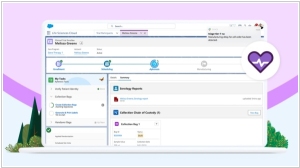Jira vs ServiceNow
May 25, 2023 | Author: Michael Stromann
73

JIRA provides issue tracking and project tracking for software development teams to improve code quality and the speed of development. Combining a clean, fast interface for capturing and organising issues with customisable workflows, OpenSocial dashboards and a pluggable integration framework, JIRA is the perfect fit at the centre of your development team.
49
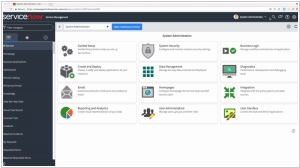
ServiceNow offers a portfolio of robust cloud-based products that automate and manage IT service relationships across the enterprise. Our products have the advantage of being built on a single cloud platform that consists of one user interface, one code base and one data model, delivering easy, automated upgrades. ServiceNow provides an intuitive and approachable user experience complete with expert services to accelerate time-to-value.
JIRA and ServiceNow are both popular and powerful IT service management (ITSM) platforms, but they have some key differences:
1. Focus and Capabilities: JIRA is primarily known for its agile project management capabilities and is widely used by software development teams for issue tracking, project tracking, and collaboration. It excels in managing software development processes and workflows. ServiceNow, on the other hand, is a comprehensive ITSM platform that covers a broader range of IT service management processes, including incident management, change management, problem management, service request management, asset management, and more. It provides a holistic approach to IT service delivery and enables organizations to streamline and automate their IT operations.
2. Target Market: JIRA is popular among software development teams, especially those following agile methodologies. It is commonly used by smaller teams or organizations focused on software development projects. ServiceNow, on the other hand, is designed for larger enterprises with complex IT environments and IT service management needs. It caters to organizations of all sizes, from small businesses to large enterprises.
3. Customization and Extensibility: JIRA offers high customization capabilities, allowing teams to tailor their workflows, issue types, fields, and reports to fit their specific requirements. It also has a wide range of third-party plugins and integrations available to extend its functionality. ServiceNow, similarly, provides extensive customization capabilities and offers a rich set of features out of the box. It also has a robust marketplace of applications and integrations that can be used to enhance its capabilities and integrate with other systems.
4. User Interface and User Experience: JIRA has a more developer-centric interface, with a focus on flexibility and configurability. It may require some technical expertise to set up and configure the system effectively. ServiceNow, on the other hand, has a more user-friendly and intuitive interface that is designed to be accessible to a broader range of users. It emphasizes usability and provides a consistent user experience across its various modules and features.
5. Pricing and Licensing: The pricing and licensing models for JIRA and ServiceNow differ. JIRA offers flexible pricing options based on the number of users and the desired deployment model (cloud or self-hosted). ServiceNow typically follows an enterprise-level pricing model, which can be higher in cost compared to JIRA. It often involves annual subscription fees based on the number of users and the scope of the modules used.
See also: Top 10 IT Service Desk software
1. Focus and Capabilities: JIRA is primarily known for its agile project management capabilities and is widely used by software development teams for issue tracking, project tracking, and collaboration. It excels in managing software development processes and workflows. ServiceNow, on the other hand, is a comprehensive ITSM platform that covers a broader range of IT service management processes, including incident management, change management, problem management, service request management, asset management, and more. It provides a holistic approach to IT service delivery and enables organizations to streamline and automate their IT operations.
2. Target Market: JIRA is popular among software development teams, especially those following agile methodologies. It is commonly used by smaller teams or organizations focused on software development projects. ServiceNow, on the other hand, is designed for larger enterprises with complex IT environments and IT service management needs. It caters to organizations of all sizes, from small businesses to large enterprises.
3. Customization and Extensibility: JIRA offers high customization capabilities, allowing teams to tailor their workflows, issue types, fields, and reports to fit their specific requirements. It also has a wide range of third-party plugins and integrations available to extend its functionality. ServiceNow, similarly, provides extensive customization capabilities and offers a rich set of features out of the box. It also has a robust marketplace of applications and integrations that can be used to enhance its capabilities and integrate with other systems.
4. User Interface and User Experience: JIRA has a more developer-centric interface, with a focus on flexibility and configurability. It may require some technical expertise to set up and configure the system effectively. ServiceNow, on the other hand, has a more user-friendly and intuitive interface that is designed to be accessible to a broader range of users. It emphasizes usability and provides a consistent user experience across its various modules and features.
5. Pricing and Licensing: The pricing and licensing models for JIRA and ServiceNow differ. JIRA offers flexible pricing options based on the number of users and the desired deployment model (cloud or self-hosted). ServiceNow typically follows an enterprise-level pricing model, which can be higher in cost compared to JIRA. It often involves annual subscription fees based on the number of users and the scope of the modules used.
See also: Top 10 IT Service Desk software
Jira vs ServiceNow in our news:
2023. ServiceNow dives deeper into task mining with latest acquisition
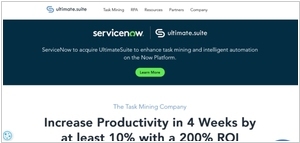
ServiceNow revealed its acquisition of UltimateSuite, a task mining company based in the Czech Republic, marking a strategic move to enhance its ability to capture and comprehend the flow of work within businesses. Task mining, a component of the expanding global market for process mining, aids companies in comprehending the workflow within an organization, identifying bottlenecks to enhance efficiency. The intention is to integrate UltimateSuite's capabilities into ServiceNow's existing process mining features. Recognizing that insights are valuable only when acted upon, the objective is to not only pinpoint areas that require improvement but also to offer an integrated platform for automating inefficiencies, thereby optimizing the entire end-to-end business process.
2023. Atlassian brings an AI assistant to Jira and Confluence
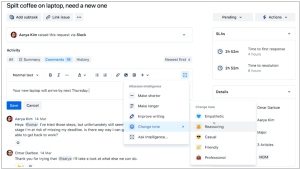
Atlassian has introduced Atlassian Intelligence, an AI-powered 'virtual teammate' that utilizes the company's proprietary models and OpenAI's large language models to create customized teamwork graphs. This technology enables various functionalities, such as AI-generated summaries in Confluence and test plans in Jira Software, as well as the rewriting of responses to customers in Jira Service Management. Atlassian Intelligence provides users with a chatbox similar to Chat-GPT, which is deeply integrated into different products and allows for the referencing of specific documents. For instance, to generate a summary of action items from a recent meeting, users can link the document with the transcript and request the summary inside Confluence. The tool then generates a list of decisions and action items from the meeting.
2022. Atlassian acquires Percept.AI
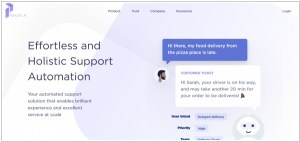
Atlassian has recently completed the acquisition of Percept.AI, an artificial intelligence (AI) company known for its automated virtual agent support solution—a chatbot that utilizes a proprietary AI engine for natural language understanding. The intention behind this acquisition is to integrate the advanced virtual agent technology into Jira Service Management, Atlassian's IT service management tool aimed at improving service delivery for both employees and customers. Percept.AI's platform, driven by data-driven proprietary technology, possesses the remarkable capability to continuously learn from customer interactions, while ensuring that every member of your team maintains full control over the AI agent's behavior and voice. This strategic move by Atlassian aims to enhance their service management offerings by leveraging AI-powered virtual agent capabilities.
2021. ServiceNow leaps into applications performance monitoring with Lightstep acquisition
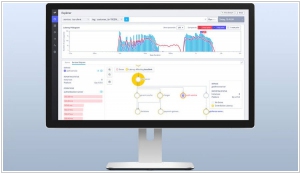
ServiceNow has recently completed the acquisition of Lightstep, a startup specializing in applications performance monitoring. By incorporating Lightstep's capabilities, ServiceNow aims to enhance its IT operations offerings. With Lightstep on board, ServiceNow will empower its customers with advanced application performance monitoring capabilities, enabling them to proactively identify and address potential issues before they escalate into major problems that could disrupt websites or applications. In the competitive landscape of application performance monitoring, Lightstep joins the ranks of companies like Datadog, New Relic, and AppDynamics (acquired by Cisco in 2017). The strategic acquisition aligns with ServiceNow's commitment to providing comprehensive solutions for optimizing IT operations.
2021. Atlassian launches Jira Work Management for every team
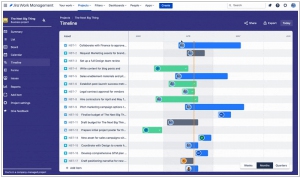
Atlassian has made an announcement regarding the introduction of a new edition of its project management tool, Jira, called Jira Work Management. The company has been actively expanding Jira's reach beyond its origins in software development teams. While Jira Service Management has successfully catered to IT teams, Jira Core has also made progress in this direction. However, Jira Work Management takes this a step further and is positioned to replace Jira Core. The objective behind Jira Work Management is to provide a version of Jira that empowers teams in various domains such as marketing, HR, finance, design, and more to efficiently manage their work. Moreover, if required, these teams can seamlessly connect their work with that of a company's development teams.
2021. ServiceNow acquired RPA startup Intellibot
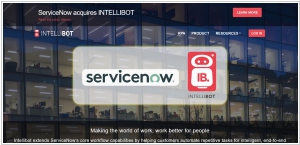
IT service management vendor ServiceNow recently joined the growing trend of embracing robotic process automation (RPA) by acquiring Intellibot, a startup based in India that specializes in RPA solutions. This acquisition aligns with the current industry focus on automating workflows across organizations. RPA offers a means to automate legacy processes, particularly those involving repetitive and mundane tasks typically performed by humans. With this purchase, ServiceNow gains the capability to integrate RPA directly into its platform. Furthermore, the company remains flexible by allowing customers to leverage RPA bots from other vendors if desired.
2021. ServiceNow adds new no-code capabilities
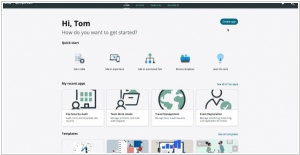
ServiceNow recognizes that the concept of distributed work has propelled the notion of enabling every employee to engage in software building. In light of this, the company has introduced a new domain known as Creator Workflows, aimed at empowering workers to construct customized workflows tailored to their specific requirements. Within this domain, ServiceNow offers a primary development environment that facilitates a user-friendly experience, allowing individuals to intuitively drag and drop the necessary components for constructing workflows that align with their needs. Additionally, templates are available to further streamline the process, providing a framework for common tasks and enhancing ease of use.
2020. ServiceNow is acquiring Element AI, startup building AI services for enterprises
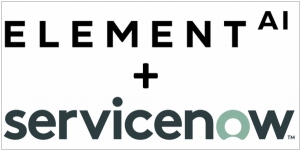
ServiceNow, the prominent cloud-based IT services company, has made a significant acquisition as part of its long-term strategy to establish a dominant presence in the realms of automation and artificial intelligence for enterprises. The company has acquired Element AI, a startup specializing in AI-driven IT services for businesses. This move exemplifies ServiceNow's ongoing efforts to build a modern platform that aligns with the evolving needs of the digital era. Although ServiceNow was established in 2004 and is not considered a traditional legacy business, it strives to position itself as the leading provider of "digital transformation" solutions. This term has gained prominence in the enterprise IT services landscape as organizations urgently adapt to conducting more online, leveraging cloud technologies, and operating remotely in response to global health challenges and future uncertainties.
2020. ServiceNow updates its workflow automation platform
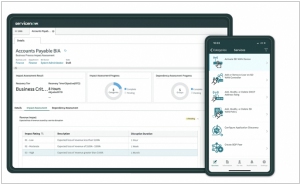
Today, ServiceNow unveiled the latest version of its workflow automation platform, showcasing a range of new solutions tailored for specific industries. Telcos and financial services organizations, in particular, are among the verticals receiving increased attention. This strategic emphasis on verticals represents a continuation of ServiceNow's ongoing expansion beyond its initial focus on core IT management functionalities, which defined the company in its early stages. Furthermore, ServiceNow has introduced additional features to enhance companies' resilience during challenging circumstances, along with the integration of new machine learning-based tools.
2020. Atlassian acquires asset management company Mindville

Atlassian has made an announcement regarding its recent acquisition of Mindville, an enterprise asset management provider focused on Jira. This acquisition marks Atlassian's entry into a new market segment, as it adds asset management tools to its existing suite of services. Mindville Insights, the flagship product of Mindville, enables tracking of assets across various departments such as IT, HR, sales, legal, and facilities within a company. While the platform is asset-agnostic, it is expected that many companies within Atlassian's user base will utilize it primarily for tracking IT assets such as servers and laptops. In addition to physical assets, the service also supports automatic importing of cloud-based servers from providers like AWS, Azure, and GCP. The Mindville team has developed connectors to integrate with popular services like ServiceNow and Snow Software. Notable customers of Mindville include NASA, Spotify, and Samsung, among others.


